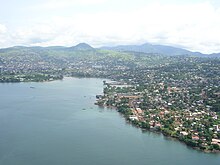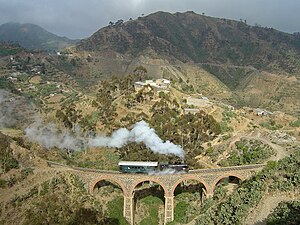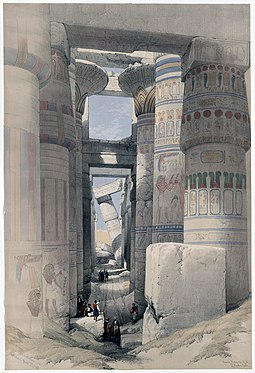Portal:Africa



Africa is the world's second-largest and second-most populous continent after Asia. At about 30.3 million km2 (11.7 million square miles) including adjacent islands, it covers 20% of Earth's land area and 6% of its total surface area. With nearly 1.4 billion people as of 2021, it accounts for about 18% of the world's human population. Africa's population is the youngest among all the continents; the median age in 2012 was 19.7, when the worldwide median age was 30.4. Based on 2024 projections, Africa's population will exceed 3.8 billion people by 2100. Africa is the least wealthy inhabited continent per capita and second-least wealthy by total wealth, ahead of Oceania. Scholars have attributed this to different factors including geography, climate, corruption, colonialism, the Cold War, and neocolonialism. Despite this low concentration of wealth, recent economic expansion and a large and young population make Africa an important economic market in the broader global context, and Africa has a large quantity of natural resources.
Africa is highly biodiverse; it is the continent with the largest number of megafauna species, as it was least affected by the extinction of the Pleistocene megafauna. However, Africa is also heavily affected by a wide range of environmental issues, including desertification, deforestation, water scarcity, and pollution. These entrenched environmental concerns are expected to worsen as climate change impacts Africa. The UN Intergovernmental Panel on Climate Change has identified Africa as the continent most vulnerable to climate change.
The history of Africa is long, complex, and varied, and has often been under-appreciated by the global historical community. In African societies the oral word is revered, and they have generally recorded their history via oral tradition, which has led anthropologists to term them "oral civilisations", contrasted with "literate civilisations" which pride the written word. African culture is incredibly rich and diverse within and between the continent's regions, encompassing art, cuisine, music and dance, religion, and dress.
Africa, particularly Eastern Africa, is widely accepted to be the place of origin of humans and the Hominidae clade, also known as the great apes. The earliest hominids and their ancestors have been dated to around 7 million years ago, and Homo sapiens (modern human) are believed to have originated in Africa 350,000 to 260,000 years ago. In the 4th and 3rd millennia BCE Ancient Egypt, Kerma, Punt, and the Tichitt Tradition emerged in North, East and West Africa, while from 3000 BCE to 500 CE the Bantu expansion swept from modern-day Cameroon through Central, East, and Southern Africa, displacing or absorbing groups such as the Khoisan and Pygmies. Some African empires include Wagadu, Mali, Songhai, Sokoto, Ife, Benin, Asante, the Fatimids, Almoravids, Almohads, Ayyubids, Mamluks, Kongo, Mwene Muji, Luba, Lunda, Kitara, Aksum, Ethiopia, Adal, Ajuran, Kilwa, Sakalava, Imerina, Maravi, Mutapa, Rozvi, Mthwakazi, and Zulu. Despite the predominance of states, many societies were heterarchical and stateless. Slave trades created various diasporas, especially in the Americas. From the late 19th century to early 20th century, driven by the Second Industrial Revolution, most of Africa was rapidly conquered and colonised by European nations, save for Ethiopia and Liberia. European rule had significant impacts on Africa's societies, and colonies were maintained for the purpose of economic exploitation and extraction of natural resources. Most present states emerged from a process of decolonisation following World War II, and established the Organisation of African Unity in 1963, the predecessor to the African Union. The nascent countries decided to keep their colonial borders, with traditional power structures used in governance to varying degrees. (Full article...)
Selected article –
The Antemoro (or Antaimoro, lit. 'people of the shore') are an ethnic group of Madagascar living on the southeastern coast, mostly between Manakara and Farafangana. Numbering around 500,000, this ethnic group mostly traces its origins back to East African Bantu and Indonesian Austronesian speakers like most other Malagasy. A minority of them belonging to the Anteony (aristocrats), Antalaotra (scribes of the Sorabe alphabet) or Anakara clans claim being descendants of settlers who arrived from Arabia, Persia and the Islamic religion was soon abandoned in favor of traditional beliefs and practices associated with respect for the ancestors, although remnants of Islam remain in fady such as the prohibition against consuming pork. In the 16th century an Antemoro kingdom was established, supplanting the power of the earlier Zafiraminia, who descended from seafarers of Sumatran origin.
The Antemoro (Anteony clan) soon developed a reputation as powerful sorcerers and astrologers, in large part owing to their monopoly on knowledge of writing, termed sorabe, which uses the Arabic script to transcribe the Malagasy language. Antemoro ombiasy (astrologer sages) migrated throughout the island, where they practiced their arts for local communities, served as advisers to kings, and even founded new principalities. This Antemoro mobility and their creation of a network of powerful spiritual advisers across the island is credited with forcing an awareness among Malagasy of communities beyond their own and sparking a sense of a common Malagasy identity. The Antemoro kingdom was disbanded in the late 19th century following an uprising of the Antemoro commoners against the noble class. (Full article...)
Featured pictures –
Did you know (auto-generated) -

- ... that in South Africa's genocide case against Israel, the International Court of Justice ordered Israel to "punish the direct and public incitement to commit genocide" against Palestinians in Gaza?
- ... that Muhsin Hendricks of South Africa has been described as "the world's first openly gay imam"?
- ... that Dahiru Musdapher, the 12th chief justice of Nigeria, was once a BBC World Service contributor for West Africa and Hausa?
- ... that the communist-era science-fiction novel Małe zielone ludziki presents a futuristic depiction of Africa that reflects Polish perceptions of the continent during the Cold War?
- ... that the 1862 Brooklyn riot involved a mob mainly comprising Irish Americans targeting African-American workers at a tobacco factory?
- ... that the bronze statue atop Thomas Eyre Macklin's 1907 South African War Memorial in Newcastle became known as the "Dirty Angel"?
Categories
Selected biography –
Cleopatra VII Thea Philopator (Koinē Greek: Κλεοπάτρα Θεά Φιλοπάτωρ, lit. 'Cleopatra father-loving goddess'; 70/69 BC – 10 August 30 BC) was Queen of the Ptolemaic Kingdom of Egypt from 51 to 30 BC, and the last active Hellenistic pharaoh. A member of the Ptolemaic dynasty, she was a descendant of its founder Ptolemy I Soter, a Macedonian Greek general and companion of Alexander the Great. Her first language was Koine Greek, and she is the only Ptolemaic ruler known to have learned the Egyptian language, among several others. After her death, Egypt became a province of the Roman Empire, marking the end of the Hellenistic period in the Mediterranean, which had begun during the reign of Alexander (336–323 BC).
Born in Alexandria, Cleopatra was the daughter of Ptolemy XII Auletes, who named her his heir before his death in 51 BC. Cleopatra began her reign alongside her brother Ptolemy XIII, but falling-out between them led to a civil war. Roman statesman Pompey fled to Egypt after losing the 48 BC Battle of Pharsalus against his rival Julius Caesar, the Roman dictator, in Caesar's civil war. Pompey had been a political ally of Ptolemy XII, but Ptolemy XIII had him ambushed and killed before Caesar arrived and occupied Alexandria. Caesar then attempted to reconcile the rival Ptolemaic siblings, but Ptolemy XIII's forces besieged Cleopatra and Caesar at the palace. Shortly after the siege was lifted by reinforcements, Ptolemy XIII died in the Battle of the Nile. Caesar declared Cleopatra and her brother Ptolemy XIV joint rulers, and maintained a private affair with Cleopatra which produced a son, Caesarion. Cleopatra traveled to Rome as a client queen in 46 and 44 BC, where she stayed at Caesar's villa. After Caesar's assassination, followed shortly afterwards by the sudden death of Ptolemy XIV (possibly murdered on Cleopatra's order), she named Caesarion co-ruler as Ptolemy XV. (Full article...)
Selected country –
 |
 |
||

| |||
Eswatini (/ˌɛswɑːˈtiːni/ ESS-wah-TEE-nee; Swazi: eSwatini [ɛswáˈtʼiːni]), officially the Kingdom of Eswatini (Swazi: Umbuso weSwatini), sometimes written in English as eSwatini, and formerly and still commonly known in English as Swaziland (/ˈswɑːzilænd/ SWAH-zee-land; officially renamed in 2018), is a landlocked country in Southern Africa. It is bordered by Mozambique to its northeast and South Africa to its north, west, and south. At no more than 200 kilometres (120 mi) north to south and 130 kilometres (81 mi) east to west, Eswatini is one of the smallest countries in Africa; despite this, its climate and topography are diverse, ranging from a cool and mountainous highveld to a hot and dry lowveld.
The population is composed primarily of ethnic Swazis. The prevalent language is Swazi (siSwati in native form). The Swazis established their kingdom in the mid-18th century under the leadership of Ngwane III. The country and the Swazi take their names from Mswati II, the 19th-century king under whose rule Swazi territory was expanded and unified; the present boundaries were drawn up in 1881 in the midst of the Scramble for Africa. After the Second Boer War, the kingdom, under the name of Swaziland, was a British protectorate from 1903 until it regained its independence on 6 September 1968. In April 2018, the official name was changed from the Kingdom of Swaziland to the Kingdom of Eswatini, mirroring the name commonly used in Swazi.
Selected city –

Freetown (Krio: Fritɔun) is the capital and largest city of Sierra Leone. It is a major port city on the Atlantic Ocean and is located in the Western Area of the country. Freetown is Sierra Leone's major urban, economic, financial, cultural, educational and political centre, as it is the seat of the Government of Sierra Leone. The population of Freetown was 1,347,559 as of the 2024 census.
The city's economy revolves largely around its harbour, which occupies a part of the estuary of the Sierra Leone River in one of the world's largest natural deep water harbours. (Full article...)
In the news
- 27 March 2025 – Haitian crisis
- A Kenyan police officer is killed in a suspected gang ambush, according to Haitian authorities. Kenya has confirmed that the officer is missing but has not yet verified his death. (BBC News)
- 27 March 2025 –
- Six people are killed and 39 others rescued after a submarine carrying Russian tourists sinks off the Red Sea coast of Hurghada, Egypt. (BBC News)
- South Sudanese vice president Riek Machar is detained by security forces following an arrest warrant on "unclear charges", according to his spokesperson. The Sudan People's Liberation Movement-in-Opposition says Machar's arrest has effectively ended the 2018 peace agreement which ended the civil war. (Sky News)
- 26 March 2025 – Sudanese civil war
- Battle of Khartoum
- RSF occupation of the Khartoum International Airport
- The Sudanese Armed Forces retakes Khartoum International Airport from the Rapid Support Forces (RSF) and seizes state institutions in Khartoum captured earlier in the war by the RSF. (Al Arabiya)
Updated: 23:05, 27 March 2025
General images -
Africa topics
More did you know –

- ...that the 1459 Fra Mauro map (pictured) reports that "a junk from India" rounded the Cape of Good Hope in 1420, around 70 years before the navigations of Vasco da Gama?
- ...that the 1998 Sudan famine was caused by human rights abuses in the midst of the Second Sudanese Civil War?
- ...that a smokie is a West African delicacy made by blowtorching the carcass of a sheep or goat without removing its fleece?
- ...that Anne-Marie Nzié, a Cameroonian bikutsi singer, dedicated the song Liberté to President Paul Biya and his party, the Cameroon People's Democratic Movement?
Related portals
Major Religions in Africa
North Africa
West Africa
Central Africa
East Africa
Southern Africa
Associated Wikimedia
The following Wikimedia Foundation sister projects provide more on this subject:
-
Commons
Free media repository -
Wikibooks
Free textbooks and manuals -
Wikidata
Free knowledge base -
Wikinews
Free-content news -
Wikiquote
Collection of quotations -
Wikisource
Free-content library -
Wikispecies
Directory of species -
Wikiversity
Free learning tools -
Wikivoyage
Free travel guide -
Wiktionary
Dictionary and thesaurus



























































































